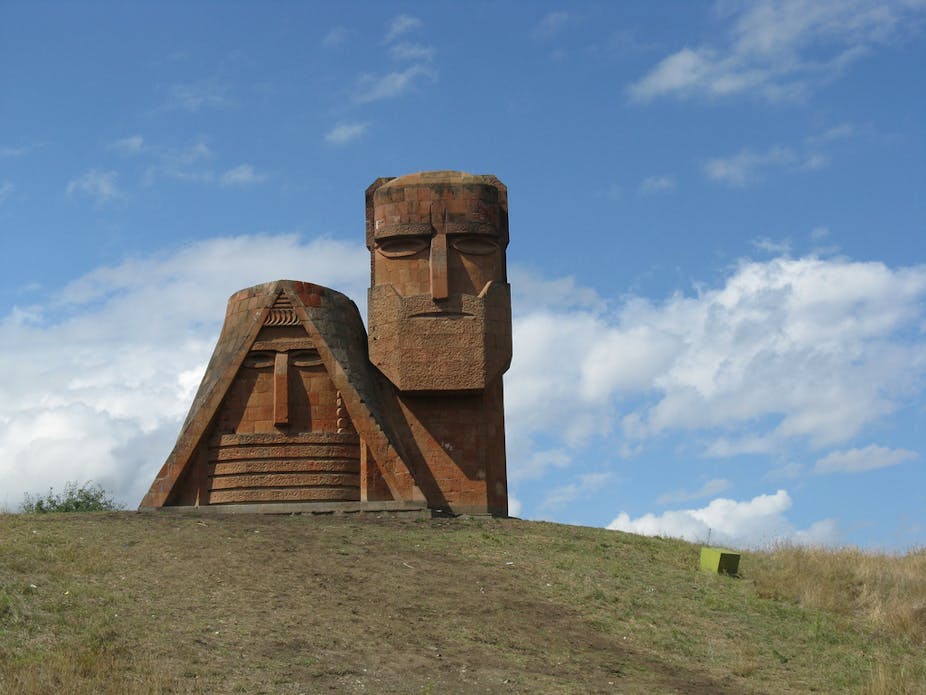What is the quickest route to international recognition? Aspiring states may try to ally themselves with a great power, lobby national governments, or even try to enlist the support of celebrities, which worked very well in the case of South Sudan. But whatever strategy they choose, the internet has become one of the key arenas in their struggle for recognition.
Separatist movements would historically gain recognition as states if they had managed to gain effective control over the territory to which they laid claim. But this is not how the current international system works.
Web presence
The creation of new states is very rare indeed but self-proclaimed states are more common. Abkhazia (Georgia), Nagorno Karabakh (Azerbaijan), Northern Cyprus (Cyprus), Somaliland (Somalia) and Transnistria (Moldova) have all managed to gain control over territory, often through warfare, and have established governments, parliaments, courts, health and education systems, and other characteristics we usually associate with states. Yet in spite of these successes, most have failed to gain widespread international recognition. Recognition is fundamentally a political decision and these territories therefore try to convince the international public, and their leaders, that they deserve it, and that recognition would serve strategic interests.
Much of this struggle is now being played out online. A big trend is for the de facto governments to create websites from which they espouse the virtue of their territories. On these sites, they tend to claim two things: that they already function as stable, effective entities and that they are democratic.

Transnistria’s foreign ministry, for example, presents the entity as independent and democratic and proceeds to list its many attributes of statehood, including “its own constitution, controlled territory, legislation, market economy, developed financial and tax systems, modern communications infrastructure, army, militia, security service, national flag, coat-of-arms, and anthem”.
Somaliland’s government, which presents itself as “democratic and visionary”, similarly lists Somaliland’s attributes of statehood as a key argument for its recognition and the government points out that there is growing global support for its independence.
Counter attack
Their arguments are vehemently opposed by the states to which these territories legally still belong. Countries such as Georgia and Azerbaijan also make frequent use of the internet to counter these messages, and instead describe these entities as illegal breakaway territories founded on ethnic cleansing, controlled by unscrupulous leaders, and dominated by organised crime.
The strategies used by the unrecognised territories can therefore be described as “competitive democratization” or “competitive state-building”. They are trying to convince the world that they are more democratic and more stable than their parent states. Since most of these entities emerged from violent conflicts, they are also keen to demonstrate their peaceful intentions.
The foreign ministry of Nagorno Karabakh for example argues that recognition would promote “stability and long-lasting peace in the region”. In essence, these states are arguing they are the good guys and deserve recognition. That recognition is presented as a pragmatic solution that will lead to more peaceful outcomes.
Another purpose
So far, this quest for recognition – whether online or offline – has not been successful. Although the Somaliland government maintains on its website that recognition is its “number one priority”, these websites also serve a different purpose.
Territories hoping for independence present themselves as already functioning states in the hope that they can gain access to the international system and that other states will trade with them, investors will spend their money there and tourists will visit. This would all make survival easier, and more pleasant, even without international recognition.

The Somaliland government website argues that the territory has “one of the most thriving economics in Africa” and the Transnistrian counterpart also highlights the many economic opportunities it can offer and a detailed powerpoint presentation for potential investors. Over in Nagorno Karabakh, several websites try to sell the entity to investors with posts such as 10 Reasons to Invest and aim to raise money from the Armenian diaspora.
Domain name game
Fighting for independence digitally is an innovative approach in what is, for many, a longstanding struggle. But these digital strategies are hampered by a significant problem. A lack of legal recognition offline prevents their progress towards what might be seen as the most important step for online progress – getting a top level domain name. Where the UK uses .co.uk or France uses .fr, there is as yet no equivalent for these entities. Nagorno Karabakh usually borrows Armenia’s, Somaliland uses .com and Transnistria uses .org.
Then there are other, more subtle barriers. Drop-down menus that ask you which country you are in on sites such as Skype and Amazon to do not include these territories and they do not feature on Google maps or similar sources. They are, in many ways, places that don’t exist and although the de facto authorities try to counter this with their own websites, their resources are limited and certainly no match for internet giants like Google and Amazonn.

